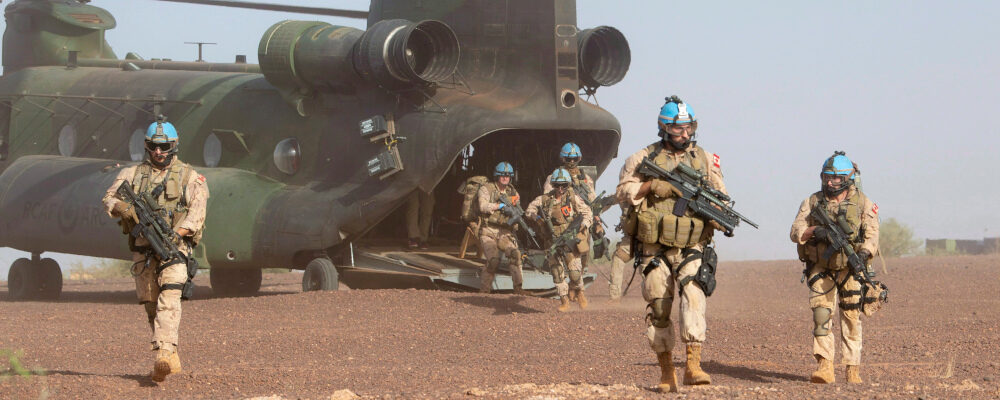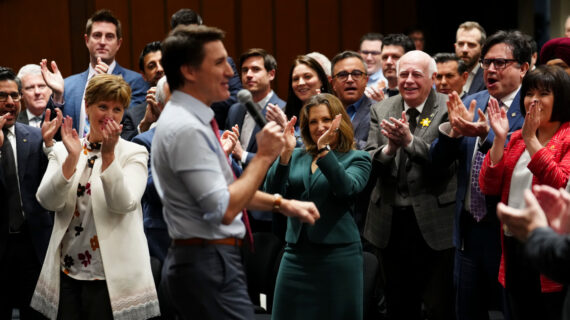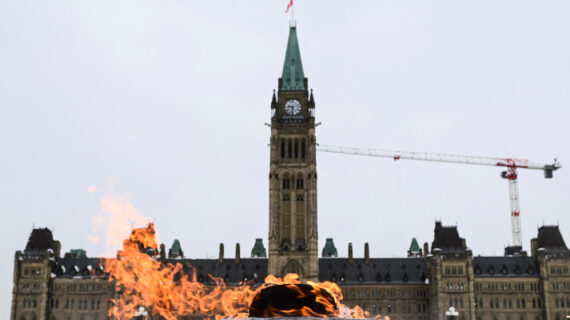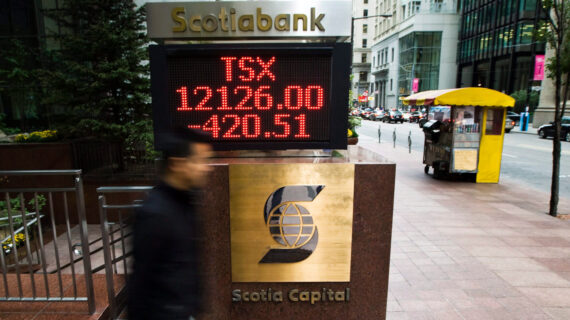In 2016, Prime Minister Justin Trudeau promised at a peacekeeping conference in Paris that Canada would create a contingent of 600 peacekeepers ready for prompt deployment. By the next year that commitment had been pared down to 200 troops, and this April, while maintaining the pledge, Ottawa said its troops would not be ready until 2026. The initial offer had come while Trudeau was campaigning—unsuccessfully—for a seat on the United Nations Security Council. Apparently, much like many campaign pledges, this one would be delayed and diminished, if not completely scrapped.
Still, peacekeeping continues to hold a special place in the mythology that Canada is a moral superpower—Lester Pearson’s Nobel Peace Prize for his role during the Suez Crisis of 1956, Canada’s record of serving on every peacekeeping operation for decades, and the 1988 Nobel Prize for peacekeepers that Canadians believed was really meant for their servicemen and women. The Canadian public loves peacekeeping, seeing it as a tribute to the nation’s unbiased fairmindedness and something that continues to differentiate us from the warlike and aggressive Americans.
But that mythology distorted some facts. Peacekeeping was never neutral in many instances. For instance, Ottawa deployed troops to Congo in 1960 to help keep the Communists out; at American urging it put troops in Cyprus for three decades to keep Greece and Turkey from fighting a war that would have devastated NATO’s southern flank; and American aircraft and equipment were necessary to get Canadian peacekeepers to the Iran-Iraq border in 1988.
Nonetheless, at its peak in the 1990s Canada had thousands of soldiers on peacekeeping and peace enforcement duties, the latter of which were more akin to combat than to keeping peace. Even the Canadian Armed Forces’ long commitment to the war against the Taliban in Afghanistan was viewed by many Canadians, despite all the evidence and the casualties, as peacekeeping.
Today, with the CAF facing shortfalls in personnel and with its equipment becoming increasingly obsolescent, many Canadians still believe that their country is a major player in UN peace operations. This is flatly incorrect. At the beginning of 2023, Canada had only 58 personnel on UN peacekeeping duties. In contrast, there are 700 soldiers in Latvia as part of a NATO effort to deter Russia from attacking the Baltic states. That Latvian effort, projected to increase in numbers, has severely strained the Army, which is short of infantry, gunners, and armoured crews.
The Trudeau government appears to have little interest in defence, despite its efforts in the Baltics. Moscow’s war against Ukraine saw Canada (rightly) ship much of its stockpiled ammunition and equipment to Kyiv and plans to acquire replacements will take years to materialize. Nor does China’s increasing aggressiveness seem to have registered on the government, though Ottawa did say it would increase deployments of the Navy’s frigates in the Indo-Pacific from two to three a year!
The 2023 budget, like those of previous years, gave almost no indication of more funding to rebuild the military, and the large procurement projects—F35 fighters for the RCAF and new combat vessels for the RCN—have been in the works for years, with inflation increasing costs to such an extent that few expect the original numbers of aircraft and ships to be acquired.
What this means for peacekeeping is clear. The Canadian Armed Forces is for all practical purposes unable to find even 200 trained personnel for a rapid deployment peace operation. And since deployments are usually limited to six months or at most a year, 200 more soldiers at home need to be training to go overseas. Once those deployed return to Canada, they need time to regroup and recover. In effect, 200 soldiers require 400 to 600 men and women in Canada to be involved in training, preparation, and recuperation. That is now beyond the Army’s capabilities.

If Trudeau’s original pledge of 600 troops for rapid response remained in effect, that would likely make the Latvian commitment impossible. Only more recruits for the CAF can fix this situation, and the government’s indifference to the military, the succession of sex abuse scandals, and the obsolescence of the force’s equipment have reduced recruitment to a trickle.
Thus Canadian peacekeeping is dead. That matters because peacekeeping did have useful effects in helping warring states to cease fighting. It mattered for the Canadian psyche, and it was relatively inexpensive for the government. But more seriously, the Canadian Armed Forces are near death. The public doesn’t seem to care, and the Trudeau government, much like most of its predecessors over the last thirty years, believes that only social programs and health care matter.
It’s not as if the world is at peace, and if a major war with China, Russia, North Korea, or Iran occurs, Canada will surely pay the price for its neglect of the military with the lives of its citizens.




